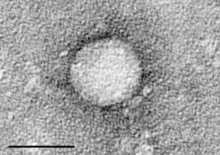Our website is made possible by displaying online advertisements to our visitors.
Please consider supporting us by disabling your ad blocker.
Positive-strand RNA virus
| Positive-strand RNA virus | |
|---|---|

| |
| Hepatitis C virus | |
| Virus classification | |
| Group: | Group IV ((+)ssRNA)
|
| Kingdom: Phylum: Class | |
| Synonyms | |
| |
Positive-strand RNA viruses (+ssRNA viruses) are a group of related viruses that have positive-sense, single-stranded genomes made of ribonucleic acid. The positive-sense genome can act as messenger RNA (mRNA) and can be directly translated into viral proteins by the host cell's ribosomes. Positive-strand RNA viruses encode an RNA-dependent RNA polymerase (RdRp) which is used during replication of the genome to synthesize a negative-sense antigenome that is then used as a template to create a new positive-sense viral genome.
Positive-strand RNA viruses are divided between the phyla Kitrinoviricota, Lenarviricota, and Pisuviricota (specifically classes Pisoniviricetes and Stelpavirictes) all of which are in the kingdom Orthornavirae and realm Riboviria.[1] They are monophyletic and descended from a common RNA virus ancestor. In the Baltimore classification system, +ssRNA viruses belong to Group IV.[2]
Positive-sense RNA viruses include pathogens such as the Hepatitis C virus, West Nile virus, dengue virus, and the MERS, SARS, and SARS-CoV-2 coronaviruses,[3] as well as less clinically serious pathogens such as the coronaviruses and rhinoviruses that cause the common cold.[4][5][6]
- ^ "Current ICTV Taxonomy Release | ICTV". ictv.global. Retrieved 3 April 2023.
- ^ Baltimore D (September 1971). "Expression of animal virus genomes". Bacteriological Reviews. 35 (3): 235–41. doi:10.1128/MMBR.35.3.235-241.1971. PMC 378387. PMID 4329869.
- ^ Lu R, Zhao X, Li J, Niu P, Yang B, Wu H, Wang W, Song H, Huang B, Zhu N, Bi Y, Ma X, Zhan F, Wang L, Hu T, Zhou H, Hu Z, Zhou W, Zhao L, Chen J, Meng Y, Wang J, Lin Y, Yuan J, Xie Z, Ma J, Liu WJ, Wang D, Xu W, Holmes EC, Gao GF, Wu G, Chen W, Shi W, Tan W (February 2020). "Genomic characterisation and epidemiology of 2019 novel coronavirus: implications for virus origins and receptor binding". Lancet. 395 (10224): 565–574. doi:10.1016/S0140-6736(20)30251-8. PMC 7159086. PMID 32007145.
- ^ Nagy PD, Pogany J (December 2011). "The dependence of viral RNA replication on co-opted host factors". Nature Reviews. Microbiology. 10 (2): 137–149. doi:10.1038/nrmicro2692. PMC 7097227. PMID 22183253.
- ^ Ahlquist P, Noueiry AO, Lee WM, Kushner DB, Dye BT (August 2003). "Host factors in positive-strand RNA virus genome replication". Journal of Virology. 77 (15): 8181–8186. doi:10.1128/JVI.77.15.8181-8186.2003. PMC 165243. PMID 12857886.
- ^ Modrow S, Falke D, Truyen U, Schätzl H (2013). "Viruses with Single-Stranded, Positive-Sense RNA Genomes". Molecular Virology. Berlin, Heidelberg: Springer. pp. 185–349. doi:10.1007/978-3-642-20718-1_14. ISBN 978-3-642-20718-1. S2CID 82608215.
Previous Page Next Page
فيروس رنا مفرد السلسلة موجب الاتجاه Arabic Positivt polariseret enkeltstrenget RNA-virus Danish Virus ARN monocatenario positivo Spanish Harizpi bakarreko eta polaritate positiboko RNA birus EU Virus à ARN à simple brin à polarité positive French Wiirus-Skööl 4 FRR נגיף RNA חד-גדילי חיובי HE 一本鎖プラス鎖RNAウイルス Japanese Positief enkelstrengs RNA-virus Dutch Vírus (+)ssRNA Portuguese


